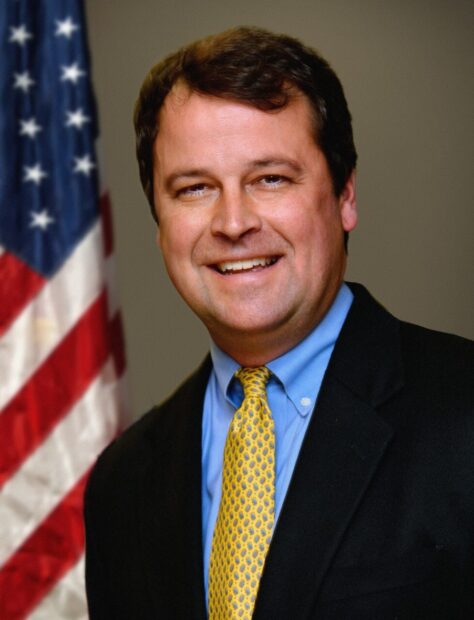
The State Board of Education is officially at full strength, after the Senate confirmed the second of Gov. Brad Little’s recent appointees Thursday.
With little debate and no opposition, the Senate quickly confirmed Boise businessman Kurt Liebich.
Liebich is chairman of RedBuilt LLC. He served on former Gov. Butch Otter’s higher education task force in 2017 and Gov. Brad Little’s “Our Kids, Idaho’s Future” K-12 task force in 2019. Liebich has also served as a board member for Idaho Business for Education, Riverstone International School and Lee Pesky Learning Center.
Liebich earned his bachelor’s degree from Bowdoin College in Maine, where he played hockey. He went on to earn an MBA in general management from Harvard University.
“I was so impressed with his knowledge and his ability to bring people together,” said Sen. Janie Ward-Engelking, D-Boise, a former K-12 task force colleague.
“Based upon his business background and experience with education, I think he’ll be a great appointee to this post,” said Senate Majority Leader Chuck Winder, R-Boise, another former task force colleague.
The State Board was short-staffed for a few months in 2019 after the terms of Don Soltman and Richard Westerberg expired. Little filled Soltman’s vacancy in September by appointing former Sen. Shawn Keough.
Then, in December, Little appointed Liebich to fill Westerberg’s vacancy.
Both appointments were subject to Senate confirmation, and Keough was confirmed earlier this session.
Liebich and Keough will serve five-year terms on the policy-setting board, which oversees K-12 public schools and Idaho’s higher education system.
Task force recommendations
In other action Thursday, the State Board of Education adopted the recommendations Gov. Brad Little’s K-12 education task force issued in November.
The five recommendations include:
- A new statewide accountability system focused on improving K-3 literacy.
- Greater access to all-day kindergarten.
- Increasing pay for veteran teachers by building out the career ladder salary program.
- Providing training and resources to address students’ social-emotional issues.
- Increasing spending flexibility for local school districts.
House Education Committee members displayed open hostility to state superintendent Sherri Ybarra’s $1 million proposal to support students’ social-emotional learning. State Board President Debbie Critchfield, task force co-chair Bill Gilbert and Little did not attend Ybarra’s hearing Tuesday.
School bond and levy elections
The State Board also came out against bills to further restrict school bond issue or levy elections.
School election days — and the frequency of bonds and levies — have been a hot topic during the past two weeks of the legislative session.
Earlier this session, the House passed House Bill 347, which would require taxing districts, such as schools, to wait a year after a bond issue fails before running another bond issue.
Earlier this month, Rep. Wendy Horman, R-Idaho Falls, introduced a bill requiring school districts to run ballot measures in May or November. Horman’s House Bill 393, would get rid of March and August school elections.
The State Board opposed both HB 347 and HB 393, as well as any other bill that would create similar restrictions, spokesman Mike Keckler said.
Charter schools
Working quickly, the House Education Committee introduced a pair of charter school bills Thursday.
Both bills were pitched by lobbyist Blake Youde on behalf of the Idaho Charter School Network.
The first bill would require charters — but not virtual schools — to have the equivalent of 15 days’ worth of cash on hand when the fiscal year ends June 30. If the schools don’t meet that requirement, the State Department of Education may notify school’s charter authorizer that it has until the following June 30 to correct the situation. If it doesn’t correct it in a given amount of time school’s authorizer may begin revocation proceedings.
Youde said the bill helps provide a financial safety net for schools and clears up some confusion. After the meeting, Youde told Idaho Education News there is not a clear cash-on-hand requirement in law.
The second bill would provide an option for charter school operators to weight the school’s lottery admission preferences in favor of children with disabilities, children living in poverty, homeless students or other at-risk students.
Even if a school weights its lottery preferences, initial enrollment preferences would still be given to children of the school’s founders, siblings of students already attending the school, students transferring from another charter school and students living within the school’s primary attendance area.
Introducing both bills clears the way for them to return to House Education at a future date for a full hearing.
Driver’s education
The Senate passed a bill designed to help offset the cost of driver’s education.
Senate Bill 1278 would provide schools a $150 state reimbursement for driver’s ed classes. The current reimbursement is $125, a rate unchanged since 1996.
On average, a driver’s ed course costs $173.
The state funding comes from a portion of driver’s license fees, and the state has an estimated $4.9 million surplus from license fees.
The Senate passed the SB 1278 on a 24-10. It now goes to the House, where similar legislation died a year ago.
Idaho Education News reporter Kevin Richert contributed.
